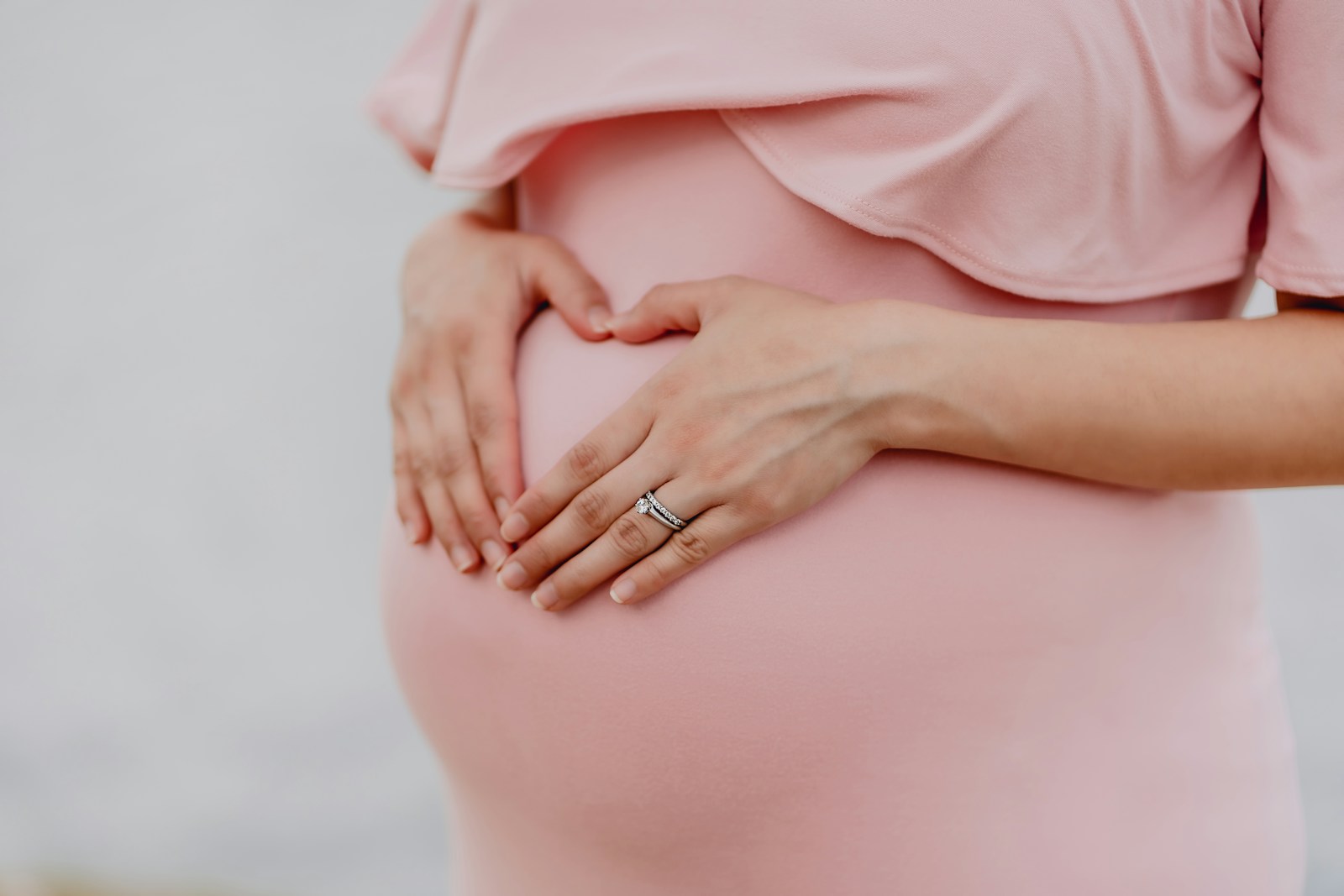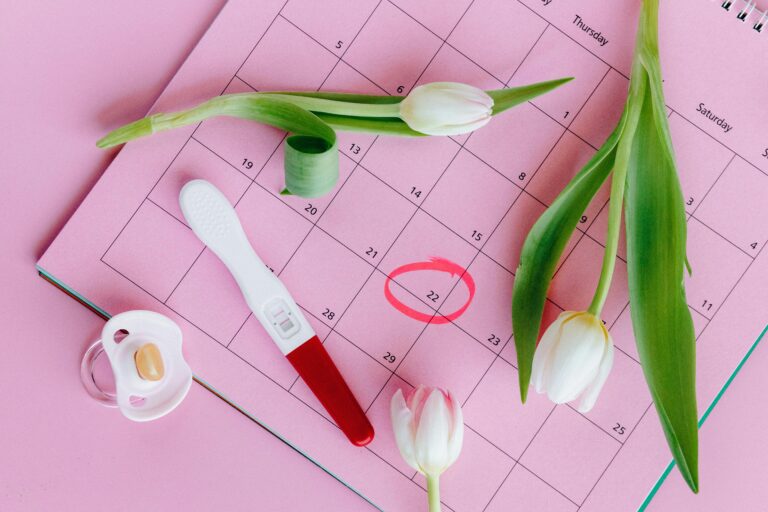A Note From My Heart
If you’re here, you’re probably in the same place so many women find themselves: counting days, analyzing every symptom, wondering if this month is finally the month. I’ve been there burping so badly from progesterone cream that I thought I was sick, crying at commercials one minute and snapping at my husband the next, convinced every cramp meant something.
The hardest part? Early pregnancy symptoms look and feel almost identical to PMS. Both are ruled by the same hormones, and the line between “your period is coming” and “you might be pregnant” is razor thin.
This blog is for you if you’re in that waiting game tired, hopeful, overanalyzing, Googling at 2 a.m. and you just want clarity. I’ll walk you through what science, my clinical practice, and my own body have taught me about the confusing signals of early pregnancy.
Progesterone Cream: Relief or Confusion?
Many women with low progesterone or estrogen dominance (like me) use progesterone cream in the luteal phase to support their cycles. It’s powerful it helps hold the uterine lining in place and can support early pregnancy if conception occurs.
But here’s the tricky part: progesterone cream can mimic pregnancy symptoms almost perfectly.
- Nausea & Burping → Progesterone relaxes smooth muscles, including the digestive tract. Food moves slower, gas builds up, and you feel burpy or nauseated.
- Dizziness & Sleepiness → Progesterone binds to GABA receptors in the brain, creating a “natural Valium” effect. You feel calm, drowsy, and sometimes woozy.
- Mood Swings → The same hormone that makes you sleepy can also lower serotonin, leaving you irritable and short-fused.
👉 When to use it: Start only after confirmed ovulation (about 3 DPO). Stopping too early can cause a hormone dip that triggers bleeding. If pregnancy is possible, continue until your period is due and if you test positive, keep using it until your doctor gives you a long-term plan.
Hunger That Feels Bottomless
Around 6–8 DPO, you might feel hungrier than ever like no meal is enough. That’s not your imagination.
- Progesterone increases appetite and slows digestion, making you feel both empty and bloated at the same time.
- Blood sugar swings become more common in the luteal phase, leading to cravings (especially carbs and sweets).
- Possible pregnancy connection: If implantation is happening, your metabolism is already shifting, and some women feel this as insatiable hunger.
💡 Tip: Don’t fight it fuel it. Eat protein every 3–4 hours, balance with complex carbs (oats, sweet potato, quinoa), and sprinkle in magnesium-rich foods like dark chocolate, pumpkin seeds, or leafy greens. Whether it’s PMS or pregnancy, your body needs the extra nourishment.
Mood Swings: Valium Calm with a Short Fuse
This one is strange, but so real: you feel deeply sleepy, almost relaxed, but your patience is razor-thin. One second you’re chill, the next you’re snapping.
That’s progesterone again. Here’s why:
- It activates GABA receptors, calming your nervous system (hence the “Valium” effect).
- But it also lowers serotonin, which is your mood-stabilizing neurotransmitter.
- The result: a weird cocktail of calm drowsiness + irritability.
This feels very different from the sharp emotional spikes of PMS. In early pregnancy, women often describe it as “relaxed but mad” and it can be one of the earliest clues.
Smell Sensitivity
You know that moment when suddenly everything smells too strong? Coffee, perfume, soap, even your partner’s skin? That’s smell sensitivity.
- In PMS: It’s less common, but progesterone can heighten senses.
- In pregnancy: It’s very common. Rising estrogen and hCG make odors sharper, often tied to nausea or food aversions.
If you’re smelling everything more intensely than usual especially paired with nausea it could be your first true pregnancy sign.
Cramping: Not Just Pinches
Implantation is often described as a “pinch,” but for many women, it feels more like persistent PMS cramps. And here’s why:
- Burrowing embryo → The embryo actually digs into the uterine lining using enzymes. This disrupts tissue and nerves.
- Blood vessel changes → New blood supply forms to feed the embryo, which can trigger dull, heavy cramps.
- Uterine response → Light contractions help the process, which can feel achy and ongoing.
Implantation isn’t a one-second event. It’s a multi-day process (6–10 DPO). That’s why cramps can last hours or even days, and why they sometimes feel indistinguishable from PMS.
Spotting vs Period
One of the most confusing signs is spotting right before your period is due. So how do you know if it’s implantation or just early bleeding?
- Implantation bleeding → Light pink or brown, streaky, usually 1–2 days, not enough to soak a pad.
- Period bleeding → Gets progressively heavier, turns red, lasts 3–7 days.
💡 If you see brown streaks and cramps around 7–10 DPO, it could be implantation. If it grows heavier and red, it’s more likely your period.
Body Temperature Clues
If you’re using Oura, Natural Cycles, or basal body temperature (BBT) tracking, you have an extra tool: your temp chart.
- After ovulation: Temps rise 0.3–0.5 °C (0.5–1.0 °F).
- If not pregnant: Temps drop back to baseline the day before or of your period.
- If pregnant: Temps stay high for 14+ days past ovulation. Sometimes you’ll even see a triphasic pattern a second little rise about a week after ovulation, often tied to implantation.
👉 If your temps are still high past your period due date, that’s one of the clearest early signs of pregnancy.
Itching & Dry Skin
A less-talked-about sign: itchy, dry skin after ovulation.
- Low estrogen = less skin hydration.
- High progesterone = fluid pulled inward to support the uterus.
- Pregnancy possibility = increased circulation and blood volume can also trigger itching.
If you suddenly feel itchy all over or notice dry patches in the luteal phase, hormones are the culprit and if it persists past your missed period, it may be pregnancy-related.
PMS vs Pregnancy: The Overlap (and the Subtle Differences)
The hardest part of the two-week wait is that PMS and early pregnancy can feel almost identical. Both are ruled by progesterone, both can cause bloating, mood swings, and breast tenderness, and both can leave you second-guessing every twinge. The difference is often in the intensity, persistence, and timing. In early pregnancy, symptoms usually last longer, feel stronger, and sometimes come with unique clues like heightened smell, unusual hunger, or persistent dull cramps that don’t turn into a full period. Here’s a side-by-side comparison now updated with some of the less-talked-about signs you’ve been experiencing.
PMS vs. Early Pregnancy Symptom Comparison
| Symptom | PMS | Early Pregnancy |
| Missed Period | No | Yes |
| Tender, Swollen Breasts | Yes | More pronounced, longer lasting |
| Fatigue | Yes | More intense, unrelenting |
| Morning Sickness | No | Yes, nausea and food aversions |
| Frequent Urination | No | Yes, due to rising hCG |
| Implantation Bleeding | No | Possible, light spotting 6–12 DPO |
| Mild Cramping | Yes, before bleeding | Yes, dull/persistent, often 6–10 DPO |
| Bloating and Gas | Yes | Yes, more pronounced |
| Mood Swings | Yes, sharp highs/lows | Yes, “calm but irritable” (progesterone-driven) |
| Food Aversions and Cravings | Rare | Common, especially carb cravings |
| Headaches and Dizziness | Yes | Yes, can be more intense |
| Back Pain | Yes | Yes, ligaments loosening early |
| Heartburn | Possible | More likely, progesterone relaxes digestion |
| Acne and Skin Changes | Yes | Yes, sometimes more severe |
| Shortness of Breath | No | Yes, higher oxygen demand |
| Vaginal Discharge | Yes, varies | Yes, often white/creamy increase |
| Feeling “Different” | No | Yes, intuitive sense of change |
| Vivid Dreams | No | Yes, often more vivid |
| Elevated Basal Body Temperature | No | Yes, remains elevated |
| Sensitive Gums | No | Yes, bleeding/swelling |
| Itching & Dry Skin | Possible mild dryness | Yes, hormonal & circulation changes |
| Metallic Taste (Dysgeusia) | No | Yes |
| Increased Sensitivity to Odors | Rare | Yes, often very strong |
| Changes in Libido | Rare | Yes, varies widely |
| Color Changes in the Skin (Melasma) | No | Yes |
| Cold Symptoms | No | Yes, pregnancy rhinitis |
| Feeling Deeply Relaxed Yet Irritable | Sometimes, PMS drowsiness | Yes, stronger, “Valium calm + short fuse” combo |
| Increased Hunger | Yes, mild cravings | Yes, often intense and persistent |
Why Symptoms Alone Can’t Confirm Pregnancy
Takeaway:
As you can see, the overlap is enormous which is why so many women spend the luteal phase wondering if every burp, cramp, or craving means something. The biggest differences are in the way early pregnancy symptoms linger and intensify, and how they sometimes bring unexpected signs like extreme hunger, itchy skin, or an odd mix of relaxation and irritability. While no chart can give you 100% certainty, recognizing these subtle differences can help you feel more connected to what your body is telling you and remind you that whether it’s PMS or pregnancy, your hormones are doing exactly what they should.
Final Thoughts
If you’re 7–9 DPO, hungry all the time, smelling everything, burping, cramping, spotting, itching, and googling every symptom — I see you. This is the hardest part.
Here’s what I want you to know:
- What you’re feeling is real.
- It doesn’t mean you’re imagining things.
- Whether this cycle ends in a period or a positive test, your body is working exactly as it should.
✨ And if you do see two pink lines soon know that all those strange burps, cramps, and moods were your first signs of new life beginning.
💡 Next Step: If you want extra clarity each month, you can track your symptoms alongside basal body temperature. If your temps stay high beyond your period date, it’s time to test. And if your luteal phase feels too short, heavy, or confusing, supporting your hormones (with progesterone, diet, and stress management) can make a huge difference.
Here’s the hardest truth: symptoms can’t tell you for sure.
- Progesterone whether natural or from cream mimics pregnancy almost perfectly.
- Hunger, nausea, mood swings, cramps, spotting they all happen in PMS too.
- The only true confirmation is an HCG test (urine or blood) after implantation is complete.
That doesn’t mean your symptoms are meaningless. They are your body’s way of communicating. But they are whispers, not definitive proof.





